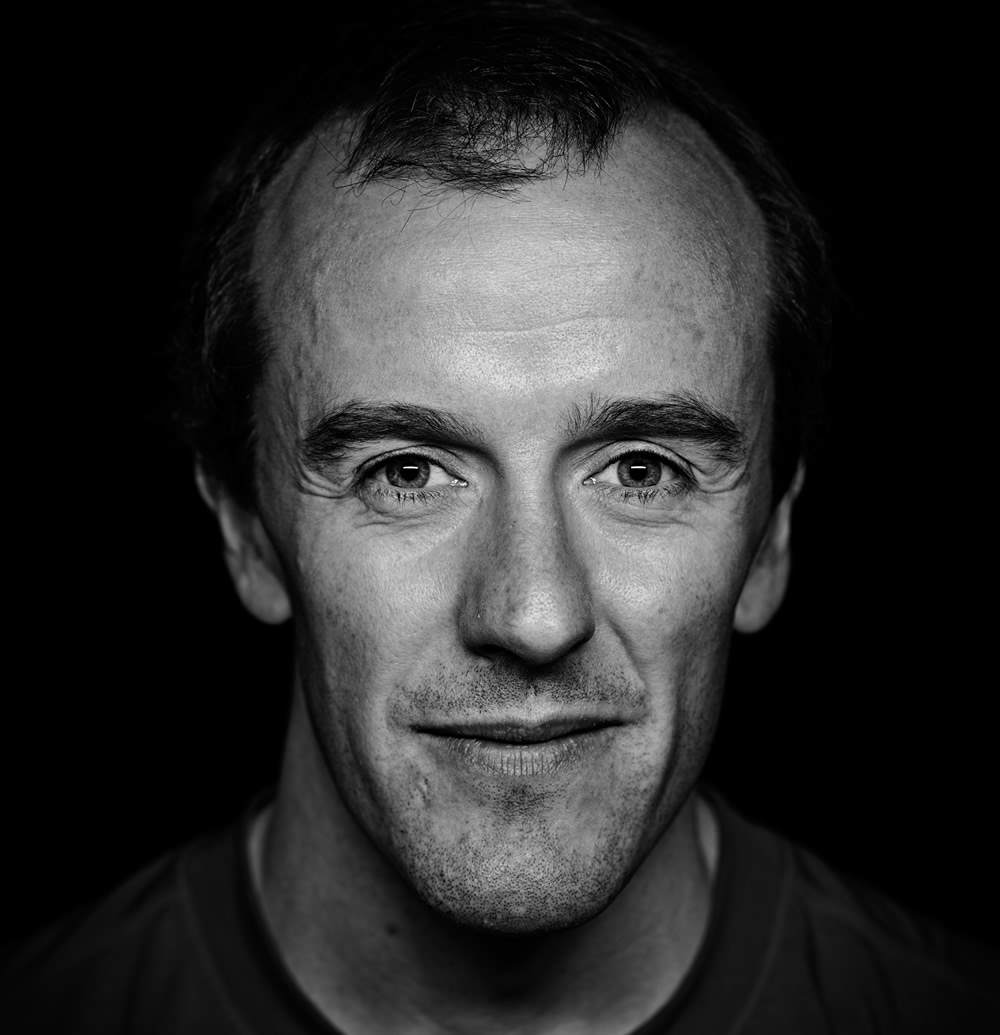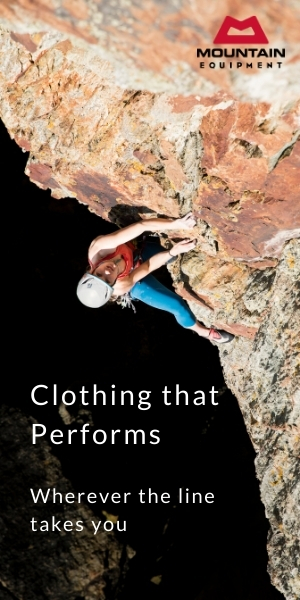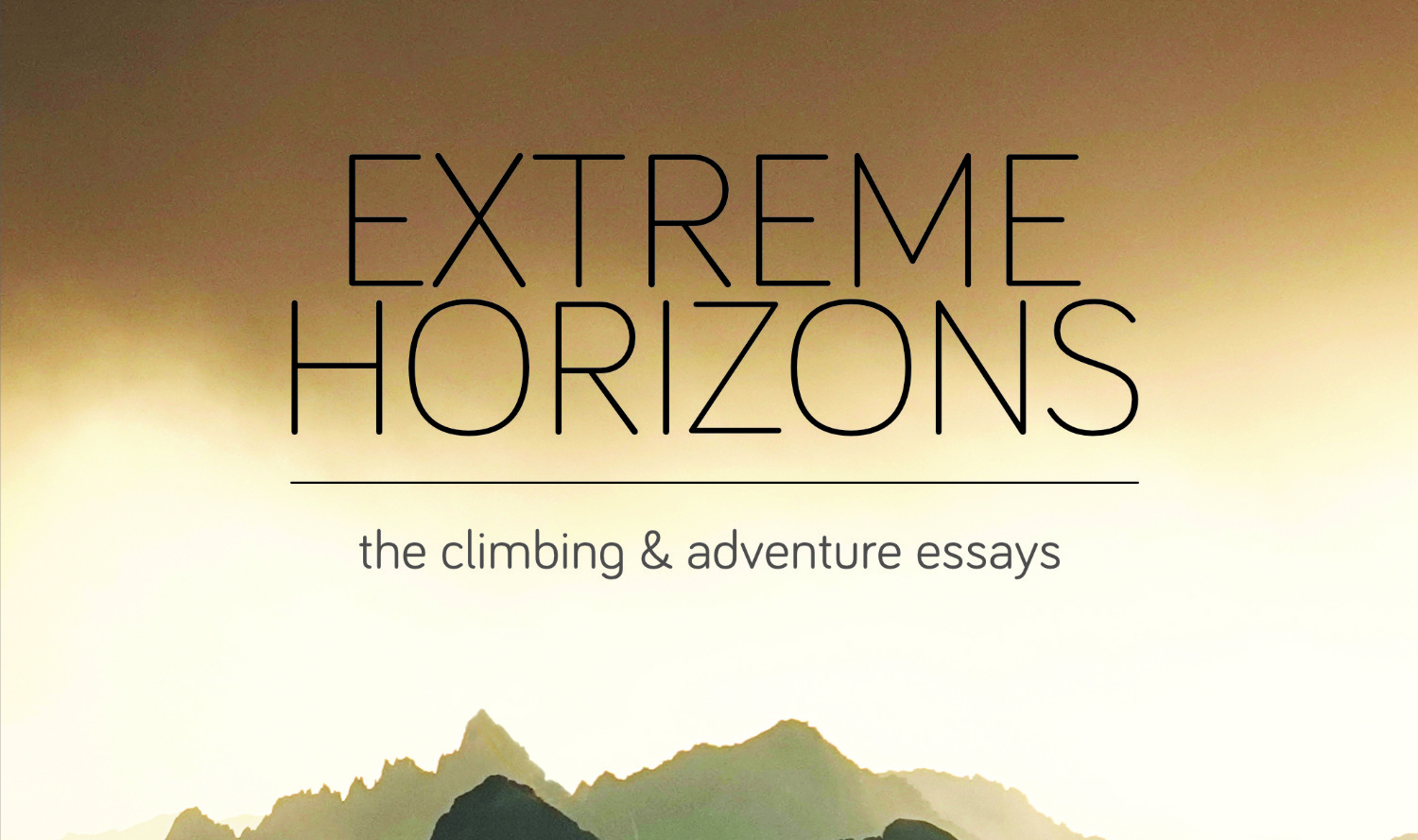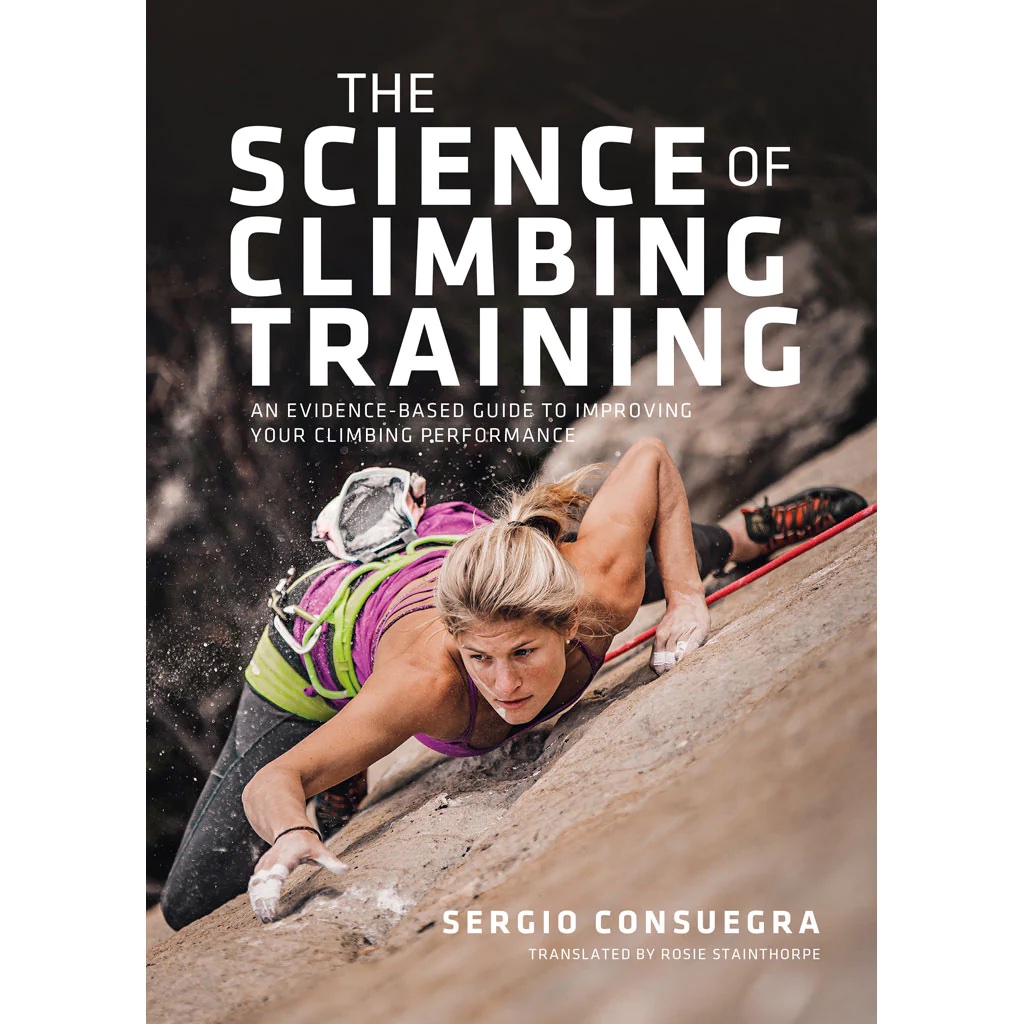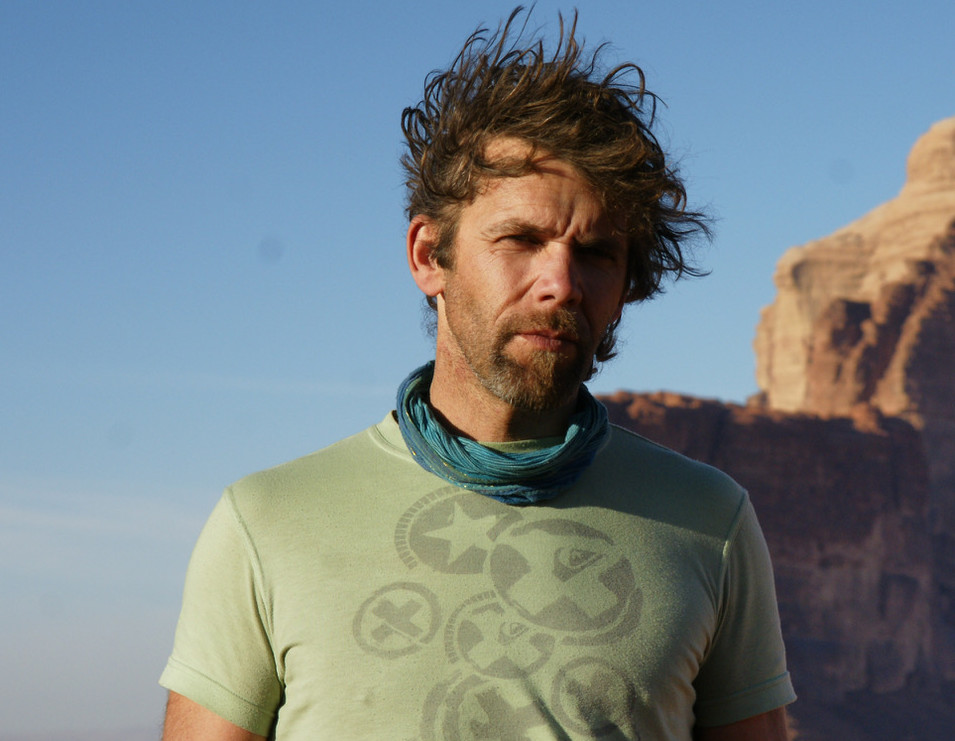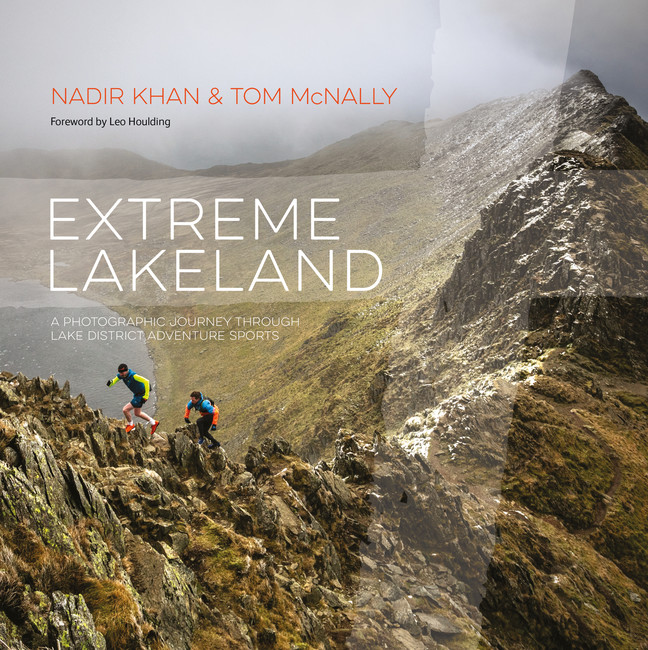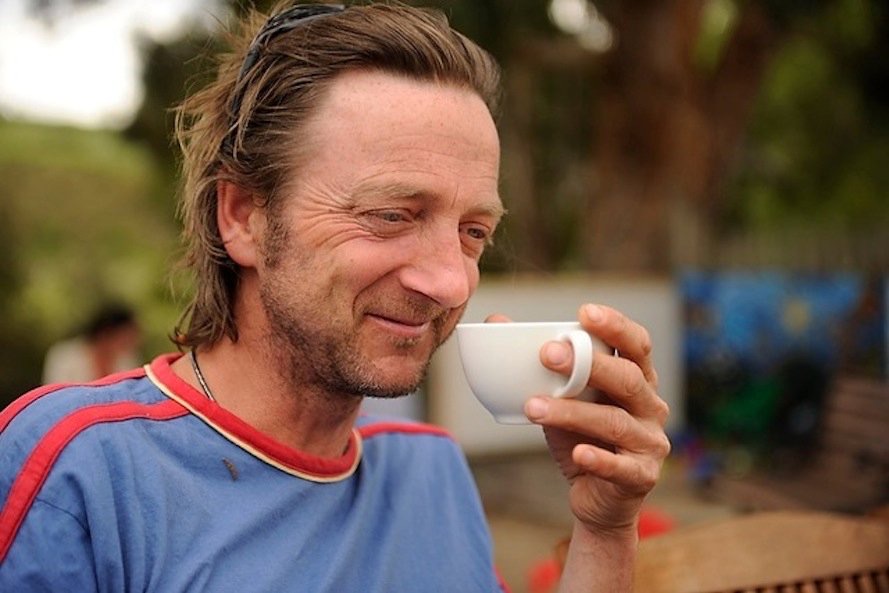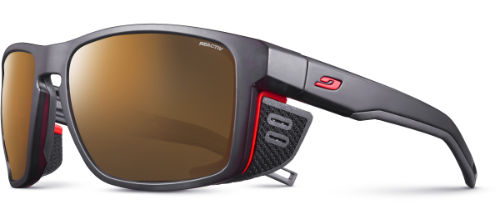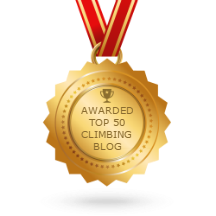Dave MacLeod is based in the highlands of Scotland and has developed his skills across a wide range of climbing disciplines to become one of the best all round climbers you'll meet... 8C boulders, 9a sport climbs, E11 trad, XII,12 mixed and 8b+ free solo with first ascents of routes such as Rhapsody, the world’s first E11 trad route, Anubis VII,12 one of the world’s hardest mixed climbs and Echo Wall on Ben Nevis alongside many FAs in Scotland. Dave also completed '24/8' in 2018, one of the hardest all-round climbing challenges around; an 8A boulder, 8a sport route, E8 trad route, VIII,8 winter route and 8 Munros, all in under 24 hours.
Dave's writing and recent Vlog series discuss training and improvement in climbing and his books '9 Out Of 10 Climbers Make The Same Mistakes' and 'Make Or Break' are among the best selling titles worldwide on training and injury prevention in climbing.
You’ve been at the cutting edge of climbing for many years, across many disciplines. Has this been a conscious decision, or your motivation simply changes from season to season, discipline to discipline?
I’ve always felt this is just part of being a climber in Scotland. I don’t really think about it, it just comes naturally. It gets quite frustrating quite quickly if you try to go against the grain of the weather and conditions here since our seasons are so wildly different. Pretty much all the climbers I looked up to when I started were all-rounders and this was still valued very strongly in Scottish climbing culture when I started. I feel like it still is, although I’m probably too biased or in my own wee bubble to know if this has changed much. So that’s what started me in multi-discipline climbing, but it was just enjoying all these different disciplines that kept me there. At a basic level, the change of scenery through the year keeps you fresh and motivated.
Can you enthuse about Scotland a bit?! I think it’s under-rated as a country and a climbing destination, and it’d be nice to showcase some of your highlights/routes/photos.
Oh yes its definitely true that Scotland is underrated as a climbing destination and country. I don’t think many folk would disagree that the scenery is really beautiful. But I think some climbers maybe don’t appreciate the variety of climbing on offer. Moreover, a key thing that I can see puts people off coming is the weather. Perhaps it's just local knowledge but I think the weather, together with the variety of climbing is an asset most of the time. Most of the UK (and a lot of Europe really) is too hot for climbing in good conditions for a big part of the year. But even in hot weather you can find good conditions for hard climbing, either on the mountain crags, or at sea level in places like the Hebrides. Also, because of the geography of Scotland, it's not that often that the whole country is wet. From my house you can usually go either out west or east and find dry conditions. The crags don’t seep the same way a lot of limestone cliffs do, so often the crag is dry in the wind in minutes. Local knowledge does help though.
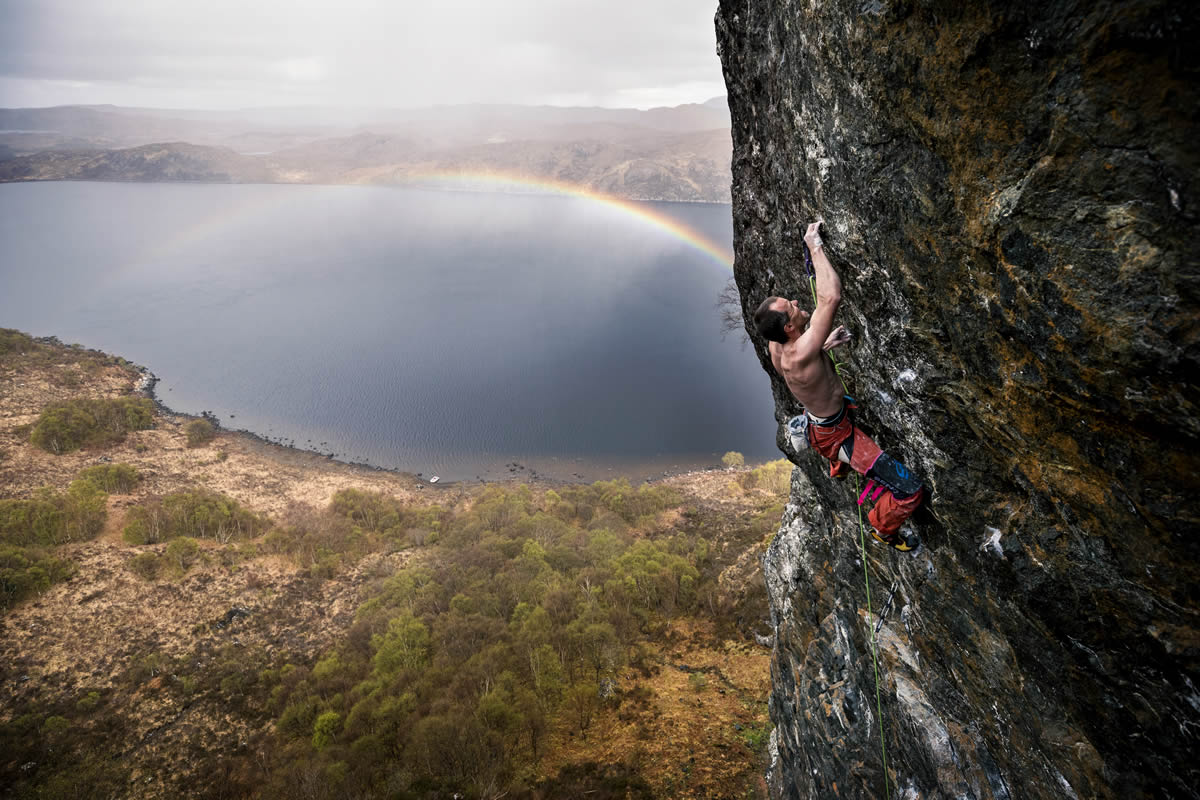
FA of Rainbow Warrior 8b, Loch Maree Crag. Photo: Dark Sky Media/Chris Prescott
There really is anything you want to climb in Scotland - 400m multi pitch routes on mountain crags or sea cliffs (such as the Longhope Route on St Johns, or Ultima Thule on Foula), Endless bouldering with tons of first ascents to be done such as in Glen Pean, trad of every shape and size, the mixed climbing, sea cliffs and some sport crags in some really amazing locations such as Loch Maree crag or Tunnel Wall. And you can pick any of those disciplines on most rock types you can think of, and then pick what altitude you want to climb at based on the conditions. And unless you are really trying, you’re not going to see anything resembling a queue of climbers at your crag.
Then there is the new routing aspect. I could climb new routes on virtually any rock type I could think of, in any discipline, at any grade, within a 25 mile radius of my house and never run out of routes.
You’re very open with your research, from training to nutrition. Can you give some golden rules/principles from decades of knowledge? (apart from ‘buy your books!’)
Sure. I think the first thing I would say is to be able to zoom out and see the big picture of your climbing. This seems pretty hard to do and I think studying sport science really helped me to cultivate the habit of doing that. At first blush, this seems paradoxical. I spent years studying intense detail of training, physiology and the little details of sport performance. But the result of this for me was to strengthen my view that athletes usually fail to achieve potential because they end up worshipping these details more than they need to, while becoming distracted from far more basic things that would give them far more mileage in terms of improvement. This was a core idea in my first book and I explored lots of examples of this in climbing.
Second, I think sports people (or any people actually!) still undervalue the power of focus. Our culture seems to me to be moving consistently in a direction of distraction - lots of tasks going on simultaneously and any ‘downtime’ between tasks being filled with other stuff to hold our attention. I think this makes it difficult to learn technique and gain expertise. If you really immerse yourself in something, such as a goal to push your climbing, you increasingly stand out. A decent proportion of people are uncomfortable with standing out and going against the grain of what their peers are doing. A lot of discourse around training for sport is about fitting sport training into a standard western lifestyle of working ridiculous hours, commuting ridiculous hours, working ridiculous hours on a spread of social media platforms and somehow finding time to train and sleep in between all that. There is not much talk of rejecting a standard western lifestyle and pursuing a climbing lifestyle instead - working less, having more time to pay proper time, attention and energy to your sport and training.
Obviously there are lots of ways to do this. But I think a list of things that would come pretty high on the list for most folk would be the following:
- Live somewhere with mountains and climbing nearby. Aside from the climbing, the cost of living is usually cheap in these places.
- Delete social media off your phone.
- Go to bed early.
- Western culture wants to sell you a lot of debt. Resist. Game the system.
- Ideally get a job that allows you to go climbing whenever the weather is good.
- Don’t eat the western diet.
- Question everything. Do you need to do it this way?
That kind of thing. If a training plan starts with addressing these issues, the rest is often pretty easy! A lot of the complication of planning training comes from being so boxed in by the lack of time, lack of capacity to train without injury, lack of energy and inaccessibility of training resources (the crags) that results from the western lifestyle. So many climbers I know live really unhealthy lifestyles. The wheels usually come off at some point between the late twenties and late thirties. It's so unnecessary! I learned a lot of what I do now the hard way. Thankfully the human body is resilient, and in my case appears to have largely forgiven the abuse I gave it in earlier years.
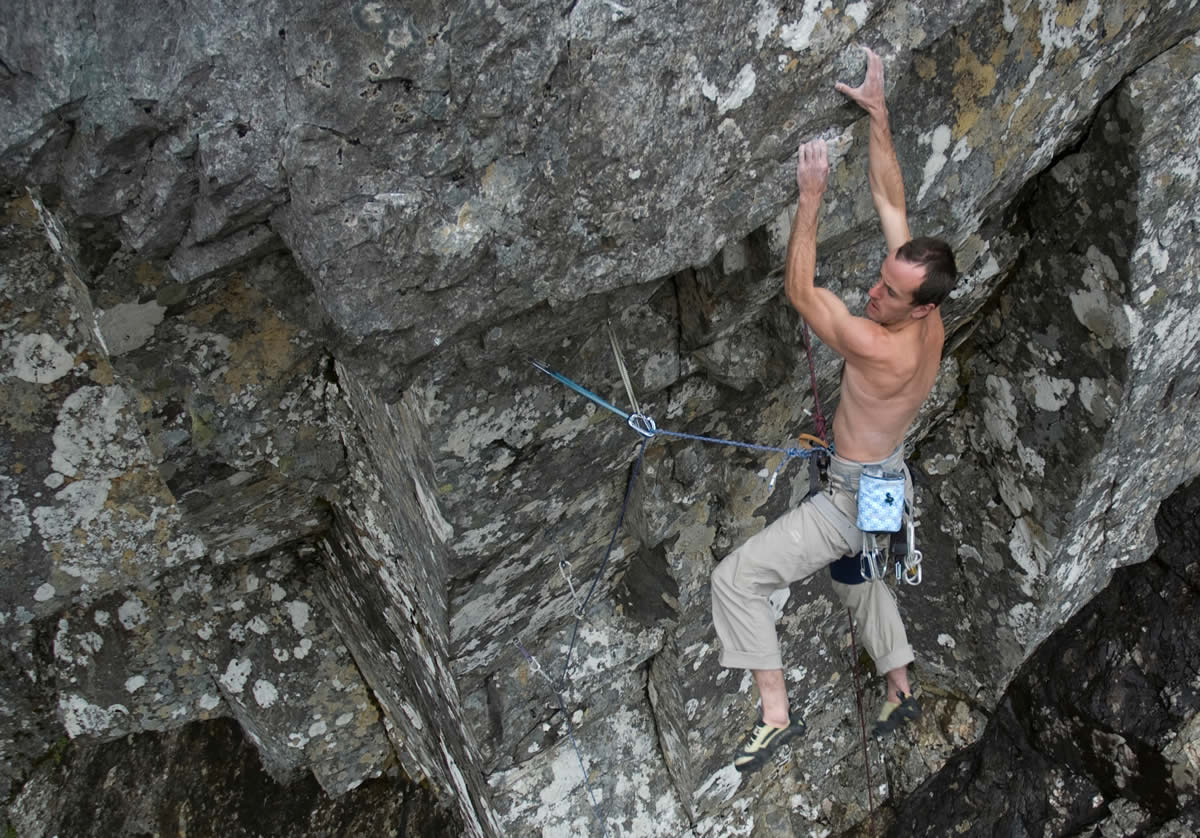 Dave MacLeod on Echo Wall. Photo: Dave MacLeod Collection.
Dave MacLeod on Echo Wall. Photo: Dave MacLeod Collection.
Do you think it’s important to have several ‘sub’ goals, leading up to the main goal (e.g. you soloed 8c for Echo Wall)?
For some people, some of the time, it might be useful to have smaller intermediate goals. I guess because goals are just something you perceive and assign some importance, you might have intermediate goals without really thinking of them in that way. I think it's perfectly fine for some people to have a singular goal and just think about that. The smaller goals can be useful to keep progress on track, such as when you can’t try the actual route. Once, when trying to do a new 9a sport route in Glen Nevis, I had a sub goal to hang this one crimp on my board, one handed, for 5 seconds. I predicted that if I could do that, I could do the route. So every session I could try it once and see that I still had a long way to go. Eventually I did it and sent the route the next day.
What did you learn from your recent fasting?
Well, to be honest, these experiments usually leave you with more questions than answers. I’ve done quite a few prolonged (7 day water only) fasts over the past three years and across the three of them I’ve learned some things. One of the things was that I made lots of mistakes and there is a surprising amount of detail to make it easier and more productive. I can see that some folk just assume that the only reason someone would want to fast is to lose weight. While it's true that one factor I was interested to look for was if the inevitable weight loss during a fast would be sustained beyond it. But I quickly learned from previous fasts that it wasn’t. But that was just one aspect of the experiment.
I was curious to see if I lost much muscle during the fasts and seemed to lose very little. I also seemed to gain a fair bit of muscle after them. In fact I recently had another DEXA scan, two years after my last and have gained 4.5kg of muscle. Quite a lot for a lean climber in their 40s!
Prolonged fasting places the body in a deep state of ketosis which has many associated physiological effects. One of these is to strongly suppress muscle loss (via a large growth hormone elevation, among other things). There will always be a little lost, but it is the bare minimum needed to make very small amounts of glucose. Moreover, the body’s autophagic process targets damaged proteins, mitochondria etc for catabolism and recycling of the nutrients. So although the lean mass might drop a little, at least some of this may be tissue that will be better lost and recycled. In other words, there may be net gain in muscle quality. That is fairly speculative though. The end of the fast is only the first phase of the process though. The fasting and then re-feed process triggers a strong anabolic response and I was interested to see what, if any, effects this might bring. Its not possible to know how much of my muscle gains over the past years have been in response to these fasts, or just my background diet which is quite different to how it was in the past. It's likely nearly all down to the background diet. But it's fun to experiment anyway.
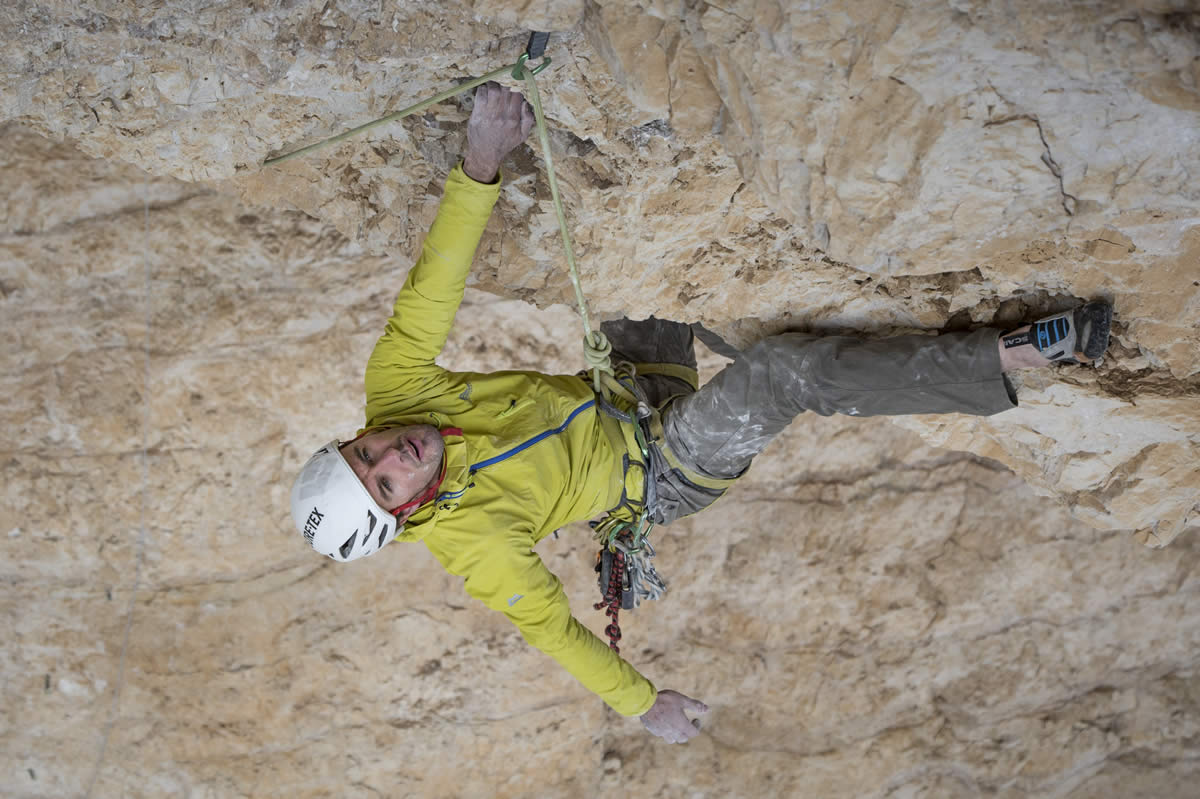 first ascent of Project Fear 8a+ on Cima Ovest, Dolomites. Photo: Coldhouse Collective
first ascent of Project Fear 8a+ on Cima Ovest, Dolomites. Photo: Coldhouse Collective
I also learned that the tendency to over eat and gain back all or often more of the fat lost during a fast is pretty strong with such a long fast. I doubt this would be the same in an obese person. But I think such a long fast is a costly intervention for an already fairly lean person. And I’m not even that lean at 17.1% body fat (by DEXA, which tends to give a little higher number than skin folds). Aside from those points, its also just interesting to see what the body can and cannot do when deprived of food for a few days. I felt fine training normally on days 1 and 3. I trained a bit again on day 6 but by then I could only do an hour of hard work on the board before I reached the edge of the glycogen store cliff! But after that I jogged up Creag Meagaidh and could have gone on all day and felt really good. I should point out though that I have intermittently followed a low carb or ketogenic diet on and off for three years and so I find exercising in the fasted state considerably easier than when I ate a continuous high carb diet in the past.
After each fast I also noticed a marked improvement in joint pains I get, mostly in my ankles after breaking them many times and damaging the articular cartilage. It's possible this improvement might have happened anyway and was unrelated to anything I did. But that’s not how it feels to me. After each prolonged fast (in the weeks and months afterwards) I’ve noticed a step-change in the pain level from these injuries. Before this, I felt they were gradually getting worse, as predicted by my surgeon. About 5 years ago I was beginning to think I’d need some serious intervention like an ankle fusion to keep being able to walk and climb in the mountains. But now I can actually run again which was utterly inconceivable for me back then. So obviously I’m curious to see if I can reproduce the effect in subsequent years.
So I’ll keep going with the experiments and do another fast next year, although I might start to tweak the protocol a bit to try and keep the good parts and mitigate the negatives (reduced training and hyperphagia) by doing a strict ketogenic diet with more classical keto ratios for a spell, on either side of a shorter fast like 3.5 days.
Which winter and summer routes stand out, and why?
Routes tend to stand out for me if I didn’t think I could do them beforehand. Rhapsody, Echo Wall, Anubis, The Hurting, Gutbuster, Lithium, Fight the Feeling. They were all climbed at different times but they all have in common that they were kind of ridiculous things to try when I first approached them. They just seemed way too ambitious. My projecting over years has been a constant game of trying to see if these ridiculous ideas really are ridiculous. So far they’ve all been totally doable in the end, especially once you get over the initial mindset block that its going to be a waste of time. To be clear, I don’t think it necessarily helps (definitely doesn’t help me) to use believe they are possible. Instead I think its necessary to embrace the idea that you are going to waste your time! I have an E10 project right now on Binnein Shuas which at first just seemed too hard, but I’ve just linked the moves a couple of times pretty smoothly and now starting to think its possible to lead. I also have a 9a project at the Anvil which I’ve tried loads and a huge amount of that time I’ve felt it was too hard for me, but now starting to think its possible. Both have a long way to go, but thats what I like.
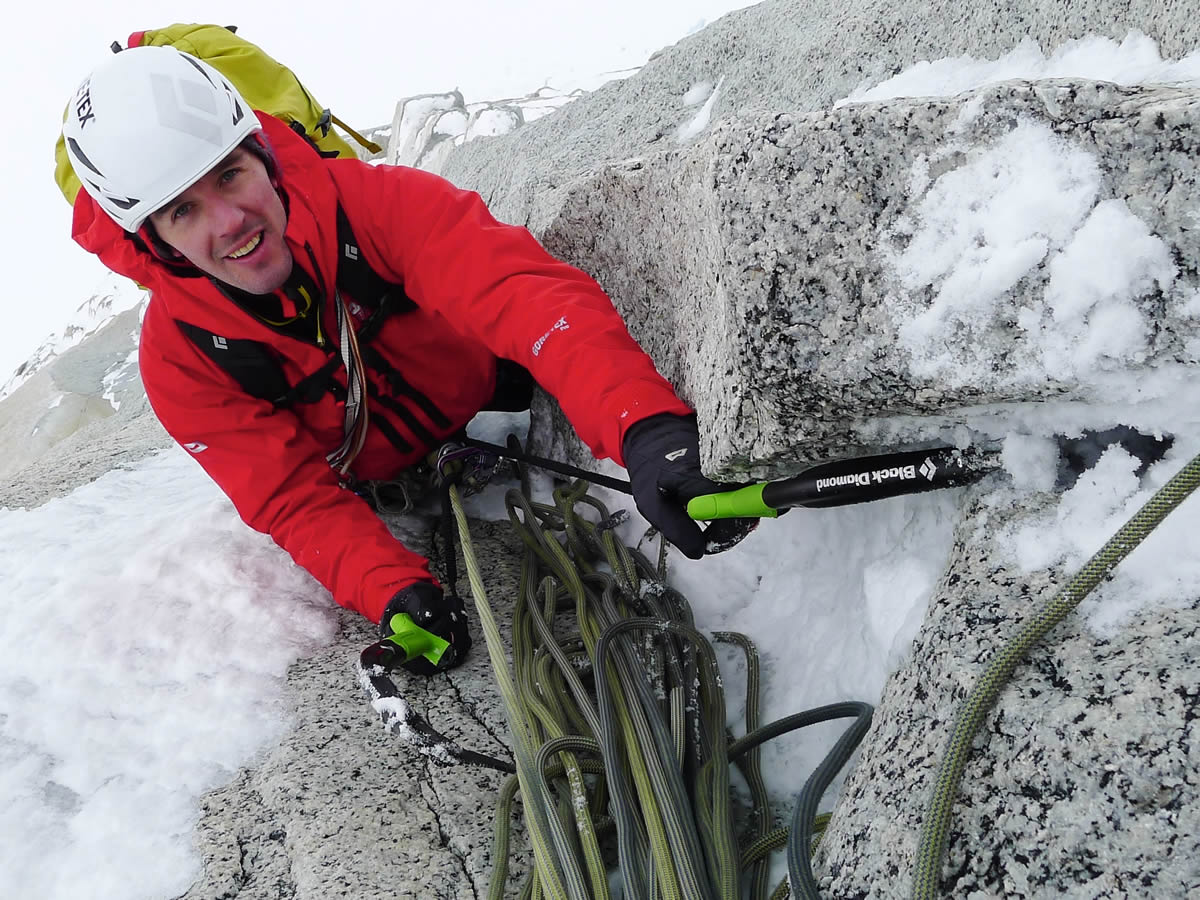
Dave MacLeod Collection
You’ve made many short films documenting/featuring other people e.g. Cubby, Helen Rennard etc. Which people have made the biggest impressions on you?
Cubby had a huge influence on me in terms of his approach to all round climbing across disciplines, being ridiculously strong fingered but also technically very precise. He also supplied me with most of my actual climbing goals (his routes) when I started out. It took me such a long time to get to the stage where I could finish a couple of projects, especially Ring of Steel 8c+ in Glen Nevis, that he didn’t quite finish. His level was so high when he was climbing. And yet I can also see that he is human and has his limitations in various ways. I learned from him and others the power of being really deeply focused and how the potential of an athlete is never realised without it. To do your best you have to really want it, every single day.
Finally, if you had to share a belay with anyone in the world, who would it be?
Well if we are talking climbers, then I’d say Fred Nicole, if he ever would be found on a belay! He strikes me as someone who has got so many things right in terms of training - focusing on excellent movement technique, and building a lifestyle that supports building that technique and also strength. So I don’t think its an accident that he opened so many ground breaking boulders that are still test pieces for the elite boulderers today, and that he’s continued to climb at that level well into his 40s. If I’m allowed non climbers then I’d have to go for many of the physiologists I follow. People like George Brooks, Bruce Ames, Keith Baar, Paul Laursen, folk like that.
You can follow Dave on his website, Facebook and Instagram and it's well worth taking a look at his Vlog series on YouTube.
Dave is supported by La Sportiva, Mountain Equipment and Black Diamond and is also involved with Urban Uprising.

